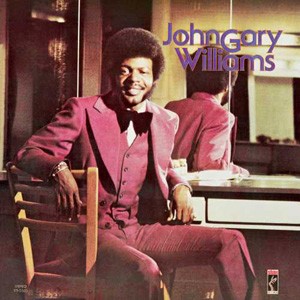
It may have taken John Gary Williams’ eponymous LP 40- some-odd years to make the journey from recording studio to record bins, but this fine example of smooth, orchestral soul seems to have landed on my record player right on time.
Williams was still a teenager in the 1960’s when he started making hits with the Mad Lads, but his promising career was interrupted by a combat tour in Vietnam. Post-service activism landed him in jail, and, although he returned to work at Stax just as that creative powerhouse started circling the crapper, he never really returned. Other people’s projects benefitted from the mad lad’s participation (we can thank him for Luther Ingram cutting, “If Loving You is Wrong”), but Williams’ solo LP, while pressed and shipped, never saw the light of day. Stax was legally, and economically embattled and the Memphis indie was feuding with corporate distribution. Record sellers weren’t getting product. The game was over.
It was 1973 when Williams laid down this socially conscious collection of sexy music, full of fluttering flutes, sweeping strings (courtesy of the Memphis Symphony Orchestra), big horns, and bass lines that just won’t quit. Featuring seasoned Stax artists like Marvell Thomas, Willie Hall, and Michael Toles, it sounds like an Isaac Hayes joint if Black Moses was a falsetto. Hot Buttered Soul lays down supporting vocals too.

Cut on the original Stax lathe, pressed in Memphis.
Watergate was still a fresh wound in ‘73, and the U.S. withdrew from Vietnam in March. The economy was stagnant, with returning soldiers coming home to not enough jobs. Civil Rights was (as it is) the great, ongoing struggle. Much of this is reflected — minimally, but impactful — in the two songs that begin and end William’s fine sign of the times — “I See Hope,” and, “The Whole Damn World is Going Crazy.” Listening to them now creates a bizarre awareness of their relative absence over the past 4-decades. Absent the drama and disaster so well documented in Robert Gordon’s Respect Yourself, it seems likely that these songs would have found their way across the airwaves, and drugstore counters, into film and TV soundtracks and the collective conscious. Like journalist/documentarian John Hubbell says, referring back to the record’s original liner notes by activist John B. Smith, this first new vinyl pressing since the the original was shipped to warehouses and left there, is less a reissue than a restoration.
Williams uses love and loss to fill the space between his song of hope and his hymn of despair, where guns are in the holy land and mothers have no sons left to care for. But even the mushier tracks are pleading: open your heart, let the good stuff in. The overall effect is one of a journey from optimism to chaos, all laid down on a comforting bed of sensual soul.
Now, as 2017 looks more and more like 1972, and headlines seem to scream the whole damn world is going crazy, here comes a brand new vintage record that says, “Sure it is baby, sure it is. But dig…”
I listened to this LP once and thought, “You know, that’s nice stuff, but most of it probably won’t break into heavy rotation at my house. Then I listened to it a second time and wondered if it would ever leave my turntable. It’s that kind of record — music that seeps in and works on you. Music that sticks.
The Restoration of John Gary Williams